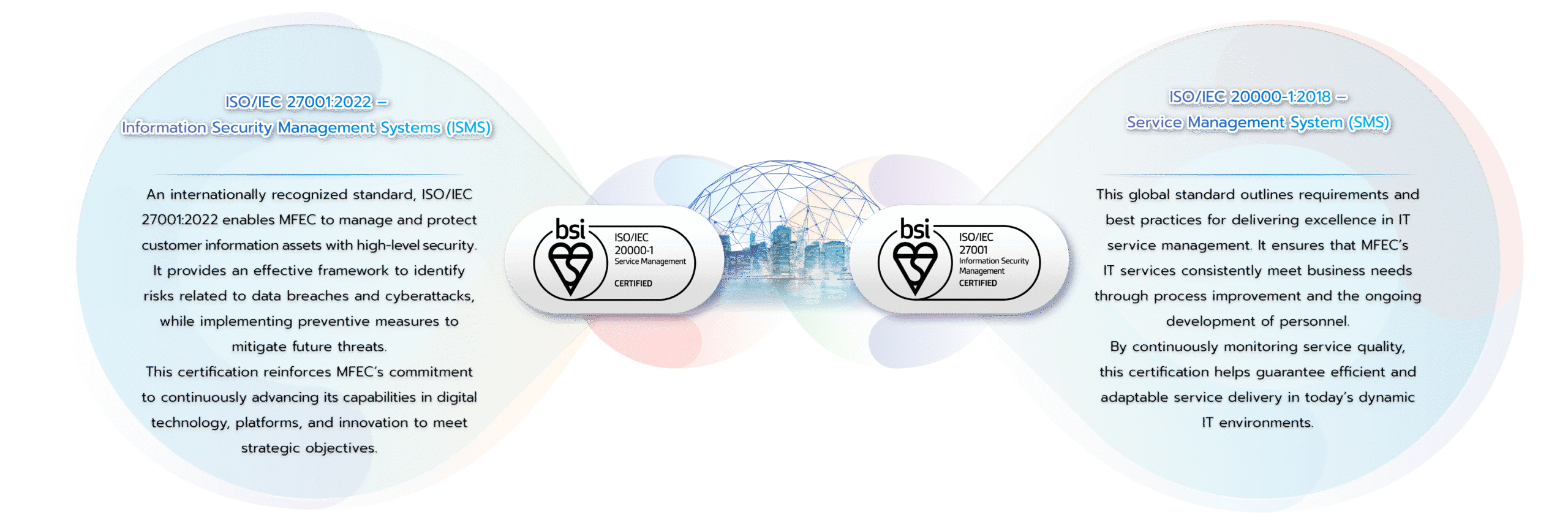Corporate Governance
MFEC firmly believes that strong corporate governance is essential to building long-term value for investors and shareholders, while driving sustainable growth and stability for all stakeholders. As such, corporate governance is embedded into the Company’s vision, mission, and core values, guiding both technological development and responsible business collaboration in alignment with good governance practices.
The Company has established and implemented a Corporate Governance Policy, Corporate Governance Manual, and Business Code of Conduct, all of which are aligned with the Principles of Good Corporate Governance for Listed Companies as outlined by the Securities and Exchange Commission (SEC) and the Stock Exchange of Thailand (SET).
These frameworks serve as operational guidelines, ensuring that the Board of Directors, executives, and employees at all levels uphold accountability, fairness, transparency, and integrity in every aspect of our business conduct.
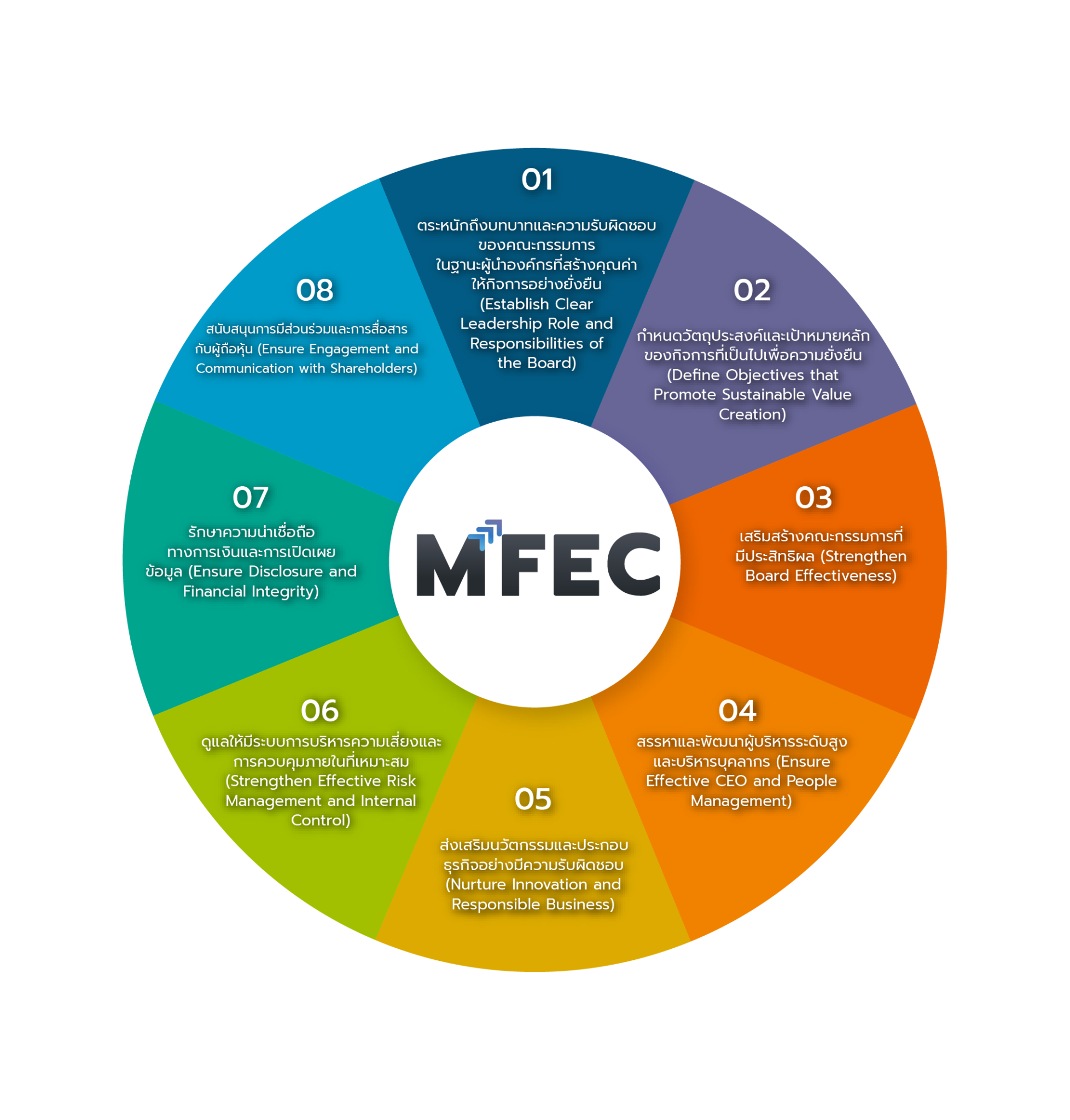
Board Composition

Board Skills and Experience
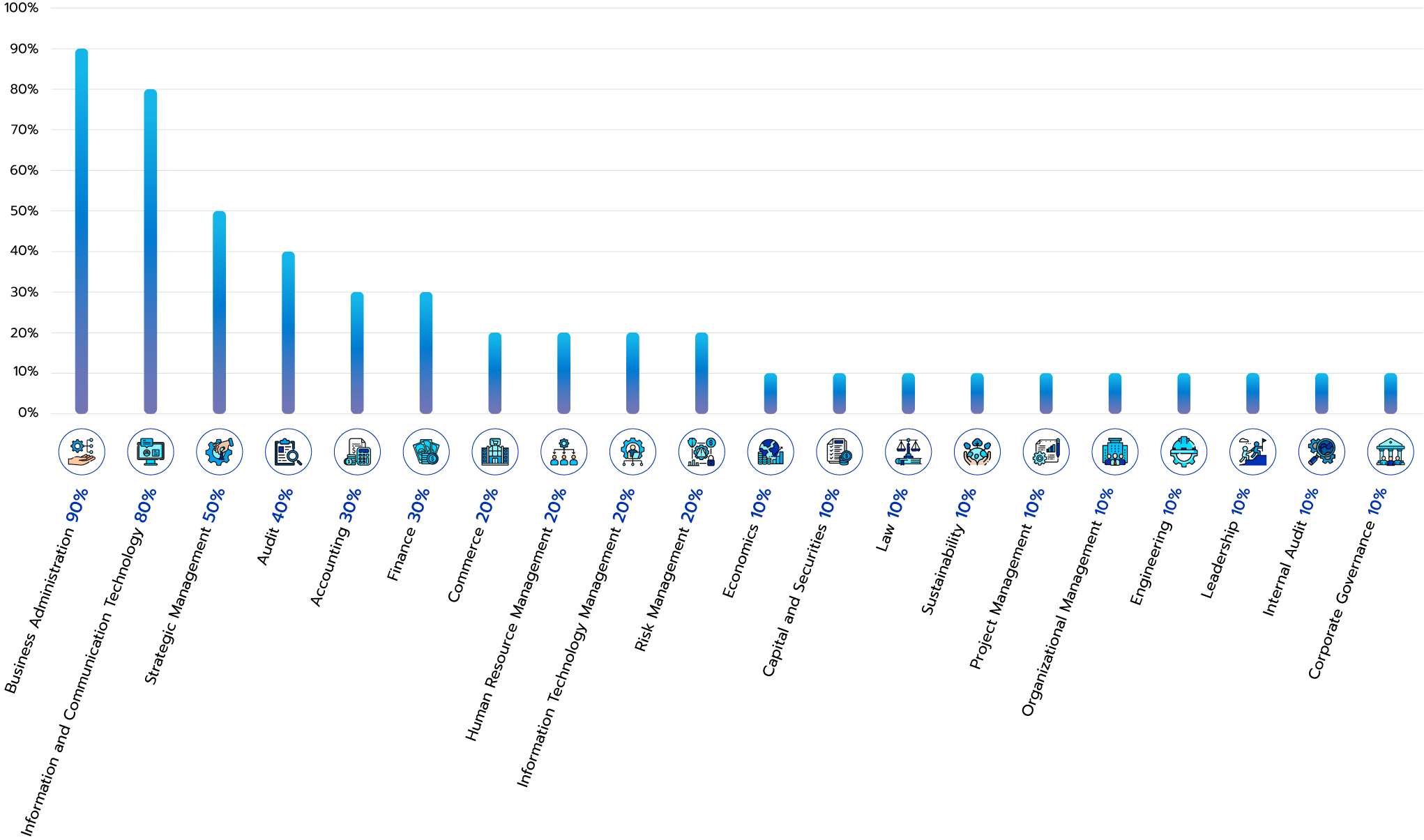
Code of Conduct
MFEC operates on the foundation of its organizational ideology that emphasizes sustainability, transparency, and social responsibility. The Company has established a code of conduct to guide employees at all levels in conducting their duties appropriately and ethically.
This code is an integral part of the Company’s internal regulations and applies to all personnel—from operational staff, business unit heads, and executives, to directors, independent directors, the Chief Operating Officer, Chief Executive Officer, and the Chairman of the Board. Everyone in the organization is required to strictly adhere to the standards outlined in the Business Code of Conduct handbook.
Additionally, MFEC has developed and enforced a Supplier Code of Conduct, which serves as a guideline for partners and vendors to conduct business responsibly within the supply chain.
Conflict of Interest Prevention
MFEC recognizes that various forms of conflicts of interest may arise during business operations. To ensure transparency and integrity in accordance with the Company’s good corporate governance policy, we have established clear policies and guidelines to prevent such conflicts—always prioritizing the best interests of the Company and its shareholders, and avoiding any actions that could result in a conflict of interest.
- All personnel must comply with the procedures and approval authorities regarding related-party transactions or any potential conflicts of interest, including the disclosure of such transactions in accordance with the regulations of the Stock Exchange of Thailand and the Securities and Exchange Commission.
- All personnel must not use confidential company information for personal gain or for the benefit of others, whether or not it causes harm to the Company. They must also strictly adhere to the Company’s insider trading and information usage policies.
- Any business dealings with the Company—whether in a personal capacity, through family, or a legal entity in which an employee has a vested interest—must be fully disclosed to the Company prior to entering into any transaction.
- Individuals must abstain from attending meetings, expressing opinions, or participating in decision-making processes on matters in which they have a direct or indirect conflict of interest, in order to ensure fair and unbiased decision-making for the benefit of the Company.
- Employees must ensure that outside business activities do not interfere with their duties or work hours at MFEC. Participation in any business that competes with the Company is strictly prohibited.
- Executives at Level D and above must obtain prior approval from the authorized body of the Company before accepting a director position in another company (except for non-profit charitable organizations).
Anti-Corruption and Anti-Bribery
MFEC is firmly committed to combating all forms of corruption and bribery. All personnel are strictly prohibited from soliciting, engaging in, or accepting any corrupt activities for the benefit of the Company, themselves, or related parties—this applies across all countries and business units. The Company has therefore established anti-corruption policies and guidelines in compliance with applicable laws and regulations, which must be strictly followed by all employees.
- Communicate anti-corruption policies and practices clearly to all levels of personnel, as well as to internal and external stakeholders.
- All employees are prohibited from engaging in, being complicit in, or accepting any form of corruption or bribery, whether directly or indirectly. They must not ignore or overlook any suspected corruption related to the Company or its subsidiaries and must report such suspicions through the Company’s whistleblowing or complaint channels.
- Activities such as giving or receiving gifts, entertainment, donations, sponsorships, political contributions, managing conflicts of interest, facilitation payments, hiring of government officials, protection of company assets, use of insider information, disclosure of information, anti-money laundering, intellectual property, legal and regulatory compliance, confidentiality, fair competition, and IT security must all be conducted transparently and in accordance with the Company’s Code of Conduct.
- Exercise due diligence when conducting business transactions with individuals, legal entities, or organizations that may be suspected of engaging in corruption or bribery.
Whistleblowing and Protection of Complainants
MFEC has established a whistleblowing and complaint system for individuals who witness or are affected by misconduct—such as corruption, violations of laws, regulations, company policies, or breaches of the Code of Conduct. You may report such matters through the following channels:
For External Stakeholders:
– Anti-Corruption Task Force
MFEC Public Company Limited
349 SJ Infinite One Business Complex, Vibhavadi Rangsit Road,
Chomphon, Chatuchak, Bangkok 10900
Tel: 02-821-7999
Email: Anti-corruption@mfec.co.th
– Online Form Submission
Please visit: IR > Corporate Governance > Whistleblowing Channel (https://ir.mfec.co.th/en/whistleblowing-channel/)
For MFEC Employees:
– MFEC Public Company Limited
349 SJ Infinite One Business Complex, Vibhavadi Rangsit Road,
Chomphon, Chatuchak, Bangkok 10900
Tel: 02-821-7999
Email: Anti-corruption@mfec.co.th
– Immediate supervisors, department heads, or designated individuals or units (e.g., Human Resources, Internal Audit) whom the whistleblower trusts
– Independent Directors or other designated Committees of the Company
Insider Trading Prevention
Directors, executives, and employees at all levels are strictly prohibited from using material, non-public (inside) information for their own benefit or for the benefit of others. While directors, executives, and employees have the freedom to invest in the Company’s securities or those of other listed companies, they must comply with the following rules:
- Disclosure of Interests:
All directors, executives, and employees must report any personal interests to the Company Secretary. These reports are compiled and submitted quarterly to the Board of Directors along with any changes in shareholding.
- Blackout Period:
Buying or selling MFEC securities is prohibited during the 30 days prior to the public disclosure of the Company’s financial statements. If any employee needs to trade MFEC securities during this period, prior approval must be obtained from the designated regulatory unit.
- SEC Reporting Obligation:
Securities transactions must be reported to the Securities and Exchange Commission (SEC) within three business days from the date of purchase, sale, or receipt of securities, in accordance with Section 59, to ensure shareholders are informed of such changes.
Anti-Money Laundering (AML)
The Company shall not accept or facilitate the transfer or conversion of assets, nor support any such activities related to criminal conduct. This policy is in place to prevent the use of MFEC’s business channels for laundering, concealing, or disguising the origins of illicit assets—which may result in damage to the Company or its stakeholders, whether directly or indirectly.
- Prior to engaging in any transaction, the source of funds must be verified to ensure they are obtained through legal means.
- Do not transfer funds to unknown accounts or accept payments that exhibit unusual or suspicious patterns, in accordance with the Company’s corporate governance policies.
- Any irregular or suspicious transactions must be reported to a supervisor immediately.
Giving or Receiving Gifts, Entertainment, or Business Hospitality
MFEC acknowledges that giving or receiving gifts, assets, or any other benefits—including entertainment and hospitality—can pose risks of corruption. Therefore, the Company has established clear policies and guidelines to ensure that such practices are conducted appropriately and transparently.
- The giving or receiving of gifts, entertainment, or customary hospitality is permissible only when it is reasonable, culturally appropriate, and within Company policy. Such actions must be transparent, publicly disclosed or disclosable, and must not influence business decisions or lead to any undue advantage, favoritism, or breach of duty. All activities must comply with the procedures prescribed by the Company.
- If an employee receives a gift or benefit valued at more than THB 3,000 on a customary or traditional occasion from a business-related party, they must report it to their supervisor and follow the Company’s reporting procedures.
- If an employee receives goods from a vendor—whether for testing, trial use, or any other purpose—they must notify the relevant department and log the items into the Company system before using them. The employee is responsible for returning the items to the Company after use.
Compliance with Laws, Rules, and Regulations
All directors, executives, and employees must strictly comply with applicable laws, regulations, and company policies. They must not knowingly participate in, assist with, or carry out any action that violates or contravenes these laws or internal regulations.
- Adhere to all company policies regarding attendance, holidays, leave entitlements, overtime, working on holidays, and all other workplace conduct, in strict accordance with the Company’s Code of Conduct.
- Act with honesty and integrity by providing truthful personal information as requested by the Company, refraining from submitting any false or misleading statements, and always protecting the Company’s interests as if they were their own.
- Maintain confidentiality by not disclosing or distributing confidential information, trade secrets, production methods, internal figures, or documents related to the Company or its business to unauthorized individuals or third parties. This also includes protecting customer confidentiality.
Use and Protection of Information and Assets
MFEC has established clear policies and practices to ensure the proper care and use of Company assets under the responsibility of employees or departments. These measures are in place to prevent loss, damage, or misuse due to improper handling or negligence.
- Directors, executives, and employees are responsible for safeguarding Company assets against loss or damage. They must use such assets efficiently and solely for the benefit of the Company—not for personal use or for the benefit of others.
- The use of IT systems and Company data must avoid any activities that could infringe on the rights of others or impair system performance. This includes avoiding non-work-related use, unauthorized software installation, system modifications, or settings changes that may compromise security. In the event of technical issues or irregularities, employees must contact the IT department. All system usage must comply with access rights, and passwords must be kept secure and not shared with others.
Unfair Competition Prevention
MFEC recognizes the importance of complying with competition laws while upholding business ethics, customer and partner interests, and fair competition with other market players. The Company has established the following guidelines to prevent unfair competition, which all personnel must strictly follow:
- The Company conducts its business based on free and fair competition, ensuring transparency, avoiding exploitation, and complying with all relevant competition laws.
- In cases of joint ventures, mergers, or acquisitions, the Company must ensure that such actions are transparent and do not result in market monopolization or create unfair competitive advantages.
- The Company does not engage in agreements or exchange business information with competitors or any other parties in ways that may lead to monopolies, restrictions, or reduction of market competition—such as price fixing, bid rigging, or market allocation.
- The Company avoids any commercial practices that may be considered unfair to other businesses, including imposing trade terms that restrict partners’ opportunities or choices.
- Employees must exercise caution when interacting with competitors or their employees and must not disclose any confidential Company information to them.
Information and System Security
MFEC recognizes the importance of information and system security. Accordingly, the Company has established an Information Technology Policy and an Information Security Policy, which all directors, executives, and employees are required to strictly comply with and support.
- Information Technology Policy
This policy outlines procedures and usage guidelines to ensure appropriate and secure use of the Company’s information systems. Key components include:
– Access request and revocation procedures
– User rights and responsibilities
– Communication via social media
– Password setting and usage
– System security standards
– Disciplinary actions for policy violations
- Information Security Policy
MFEC has defined a clear and appropriate Information Security Policy consisting of guidelines, standards, and procedures to ensure safe and efficient use of information and technology systems. This policy is divided into 9 sub-policies covering areas critical to secure, continuous operations and prevention of threats or misuse.
- Responsibilities
All directors, executives, and employees are responsible for maintaining the confidentiality, integrity, and availability of information and must use information systems in accordance with the Company’s established IT and information security policies.
Environmental Management
MFEC is committed to minimizing negative environmental impacts across our business operations and value chain. At the same time, we strive to create positive environmental outcomes through our business practices, products, services, and activities—enabling our value chain and customers to transition toward a sustainable, eco-friendly economy.
To this end, we actively support the United Nations Sustainable Development Goals (UN SDGs) by promoting the development and dissemination of environmentally friendly technologies, organizing initiatives that elevate environmental responsibility, and endorsing sustainable operational practices.
We have developed environmental policies focused on conservation, climate risk and opportunity management, and sustainable environmental practices. These efforts are designed to help our customers and business partners operate in a way that is both sustainable and environmentally responsible.
Human Rights
Human rights violations are serious issues that affect society at large. As a responsible corporate citizen, MFEC is committed to upholding internationally recognized human rights principles. We treat all stakeholders with fairness and equality, and we respect labor rights and human dignity.
- Treat others with respect and dignity, ensuring equal treatment without discrimination. This includes non-discrimination on the basis of physical or mental condition, race, religion, gender, language, age, skin color, education, social status, or any other factor.
- Perform duties with caution to prevent human rights violations in business operations and among business partners. Employees must monitor and report concerns to supervisors to prevent potential infringements of human rights.
- Ensure equal treatment in all aspects of employment—including recruitment, compensation, working hours and holidays, job assignments, performance evaluations, training and development, and career planning—without discrimination.
- Do not engage in forced labor or unlawful employment practices, and do not permit any form of inhumane punishment, intimidation, threats, harassment, or violence in any form against employees.
Occupational Health and Safety
MFEC is committed to ensuring a safe and healthy work environment for all categories of employees, contractors, suppliers, partners, and visitors—including those working off-site. The Company has established safety and occupational health measures that align with best practices to protect all individuals involved in our operations.
- MFEC provides a clean and safe working environment, along with equipment and tools that support safe operations. Resources are continuously allocated to ensure occupational safety.
- Employees are encouraged to freely raise concerns and share observations about potential health and safety risks. This helps assess and prevent hazards before they occur.
- First aid kits are made available at workplaces to support immediate response before transferring individuals to hospitals or nearby medical units.
- Emergency response plans are established to ensure all employees know how to act during emergencies, such as evacuation procedures, assembly point check-ins, and emergency contact protocols. Emergency drills, such as fire evacuation training, are held at least once a year.
- Pre-employment health checks are required to ensure candidates are fit to work. Annual health screenings are also provided to monitor employee wellness and promote early prevention and treatment.
- Drivers employed by the Company must undergo drug and alcohol testing. If a driver tests positive, rehabilitation may be offered for the first offense. A second offense or possession of illegal substances will result in immediate termination and legal action.
- Drivers must strictly comply with traffic laws, including speed limits, licensing requirements, and legal load capacities.
- All vehicles and related equipment must be regularly inspected to ensure they are in proper working condition.
- Supervisors are responsible for monitoring the behavior of their team members. If there is suspicion of drug use, the Occupational Health and Safety Committee may arrange for unannounced testing by qualified third parties.
- MFEC enforces a Stop Work Authority Policy, which empowers all employees to halt work or unsafe behavior that violates the Company’s safety, occupational health, and environmental standards.
- The Company provides regular training on workplace safety, occupational health, environmental practices, and internal rules and regulations.
- MFEC has established a Safety, Occupational Health, and Workplace Environment Committee to oversee, improve, and prevent potential hazards that could impact employees or company assets, ensuring continuous enhancement of safety and workplace conditions.
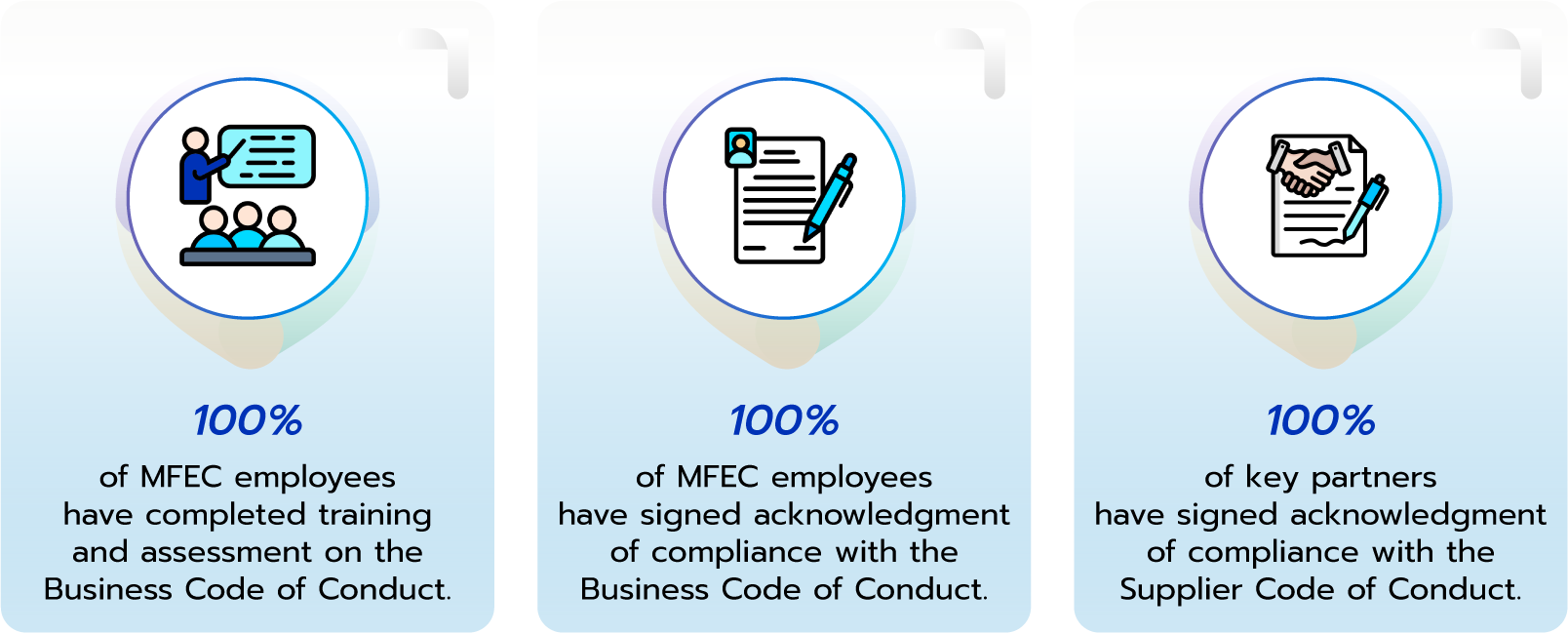
Risk Management
MFEC has adopted a structured and continuous risk management framework based on international standards, specifically the COSO Enterprise Risk Management (ERM) framework developed by the Committee of Sponsoring Organizations. The Company has established a comprehensive risk management structure and process to proactively reduce the likelihood and potential impact of risks to a level that is acceptable, measurable, controllable, and auditable.
The primary objective is to support the achievement of the Company’s goals and strategic objectives. The Risk Management Committee defines the risk management purpose, risk environment, event identification, risk assessment, risk response strategies, control activities, and ensures continuous communication and monitoring across the organization.
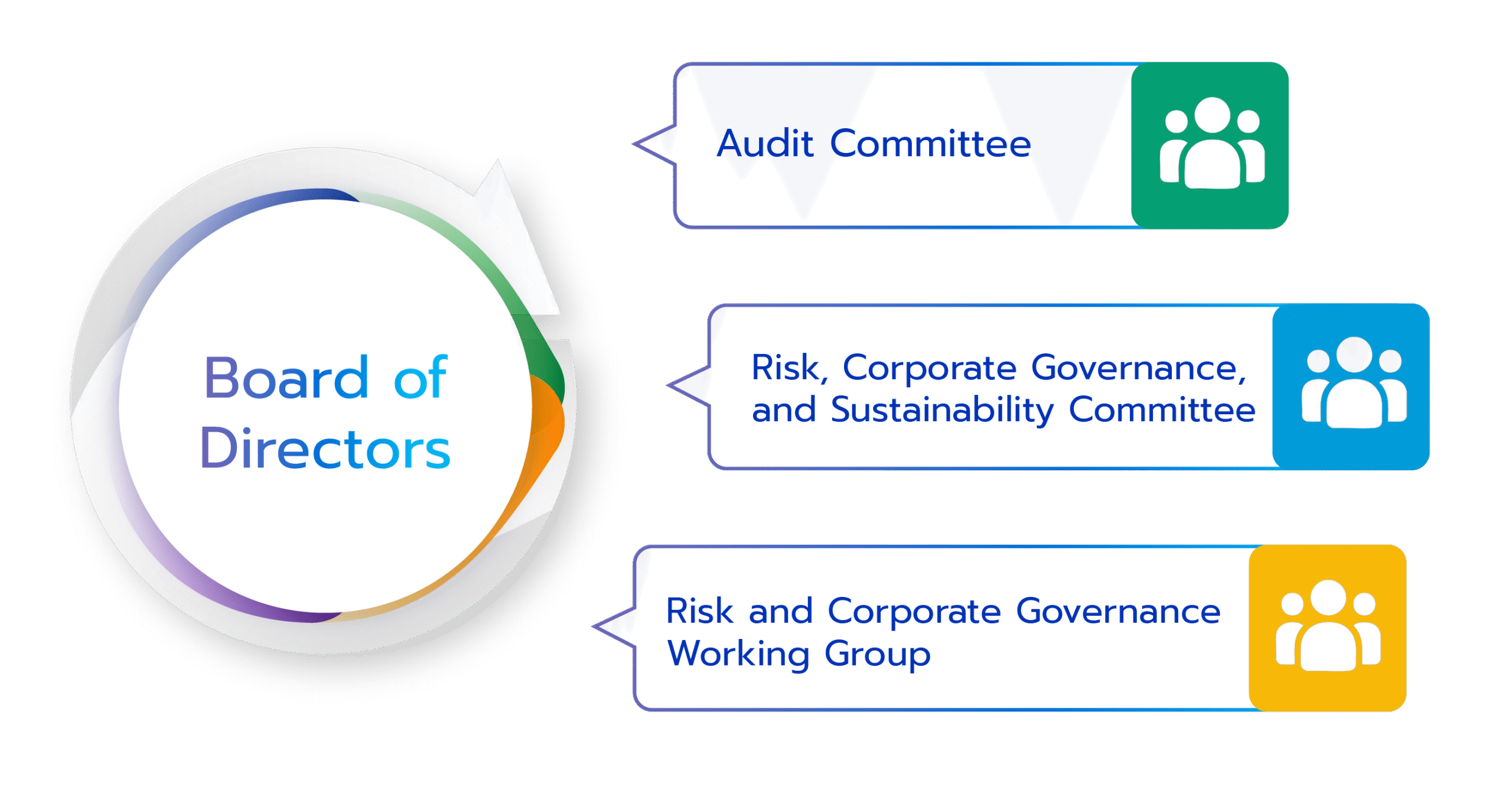
Fostering a Risk Management Culture
MFEC places strong emphasis on cultivating a risk-aware organizational culture. The Company encourages employees at all levels to develop awareness, understanding, and the necessary skills in risk management, internal control, business continuity management, and crisis management.
This enables the organization to effectively prevent and control risks that may impact business operations. Risk indicators (KRIs) are established for each department, and employees receive continuous training—both through online modules and interactive sessions—to embed risk management as an integral part of the Company’s work culture.

Business Continuity Management (BCM)
Business Continuity Management (BCM) enables organizations to respond effectively and continue operations during crises or emergency situations that could disrupt normal business activities. Without proper preparedness, such disruptions may have both direct and indirect impacts on the economy, finances, human lives, and assets. BCM is therefore essential for mitigating the effects of unforeseen incidents and ensuring that critical business processes can continue and recover within an appropriate timeframe.
MFEC has established a Business Continuity Plan (BCP), including clear policies, measures, and procedures, to ensure organizational readiness. This framework equips relevant personnel with the capabilities to respond effectively to various crises and maintain business operations with minimal disruption. The plan outlines detailed operational procedures to ensure continuity and timely recovery.

Sustainable Supply Chain Management
Effective and responsible supply chain management is a critical component in supporting MFEC’s sustainable growth. Engaging with suppliers who pose environmental, social, governance, or economic risks can affect the continuity of operations and the Company’s reputation.
MFEC therefore places strong emphasis on managing supplier relationships throughout the entire supply chain. This includes enhancing supplier capabilities to reduce both short-term and long-term risks that may impact the Company’s operations. By doing so, we aim to strengthen our competitive advantage and build lasting trust with suppliers, ensuring mutual and sustainable growth.
Establishment of the Supplier Code of Conduct
MFEC places great importance on supply chain management that incorporates environmental, social, governance, and economic considerations. To ensure a unified standard and practice, the Company has developed a Supplier Code of Conduct to serve as a guideline for all business partners.
All suppliers are required to acknowledge and accept the terms of the Supplier Code of Conduct before being selected as an official partner. In addition, MFEC conducts performance monitoring and compliance assessments at least once a year.
Selection and Registration of New Suppliers
MFEC has established a clear and systematic policy for sourcing and selecting suppliers—including manufacturers, vendors, distributors, service providers, and contractors—based on principles of fairness and transparency.
The selection criteria are well-defined and include social and environmental considerations, with a focus on supporting partners who operate ethically. All procedures follow the Company’s procurement regulations to ensure cost-effective management, operational efficiency, and long-term business collaboration.
Analysis of Key Suppliers and High-Sustainability-Risk Suppliers
Criteria for Identifying Critical Tier 1 Suppliers:
- Top 10 suppliers by purchase volume
- Suppliers of goods or services essential to core operations
- Suppliers that cannot be easily replaced
Criteria for Identifying Critical Non-Tier 1 Suppliers:
- Suppliers that play a key role in the overall business operations of MFEC’s top 10 critical Tier 1 suppliers
- Suppliers of goods or services essential to operations
- Suppliers that cannot be easily replaced
Sustainability Risk Management for Suppliers
MFEC encourages suppliers to uphold ethical business conduct by issuing an annual Supplier Code of Conduct for review and signed acknowledgment. To evaluate sustainability performance, the Company requires suppliers to complete a self-assessment questionnaire covering environmental, social, governance, and economic (ESG) aspects.
The Company has set specific criteria for supplier selection and assessment, including sending the sustainability questionnaire to all suppliers with annual purchase volumes of THB 5 million or more.
Risk Areas Covered in the Assessment
- Economic Risk: Includes the quality of goods/services, delivery timelines, and the technical expertise of the supplier.
- Environmental Risk: Covers areas such as climate change management, greenhouse gas emissions, and the organization’s environmental governance.
- Social Risk: Encompasses employee health and safety, community impact, and workplace conditions.
Supplier Site Visits (On-site ESG Audit)
MFEC has established a process for conducting on-site ESG audits of suppliers to closely assess their operations. This ensures that suppliers align with sustainability standards and helps mitigate sustainability risks across the Company’s supply chain.
Criteria for On-site ESG Audit:
- Suppliers with a purchase volume of THB 5 million or more in 2024
- Suppliers with a sustainability risk assessment score above 70 are subject to an on-site ESG audit, as they may pose a higher risk of negative impact if found to be non-compliant with sustainability standards
Supplier Sustainability Development
Supplier development is vital to achieving long-term business success. Strong supplier relationships contribute to stable and sustainable growth. To ensure effective supplier development, MFEC fosters collaboration by supporting mutually beneficial business processes—such as knowledge sharing, market insights, and updates on government policies. These efforts help reduce risks, unlock new business opportunities, and strengthen long-term resilience.
MFEC has implemented a Supplier Sustainability Development Program with the following key initiatives:
- Collaborative Strategic Planning: Jointly develop detailed strategic plans, including quarterly goals and work plans, to ensure alignment with both parties’ business objectives. This approach creates a clear operational framework and enables consistent project monitoring.
- Product and Innovation Showcases: Offer dedicated sessions for suppliers to present new products and solutions on a regular basis. These sessions keep MFEC teams updated on market innovations and emerging technologies while deepening their understanding of supplier capabilities—enhancing agility and collaboration.
- Two-way Knowledge Exchange: Actively listen to suppliers and exchange industry insights and experiences. This enables MFEC to tailor operations to meet market needs more effectively and helps bridge gaps between customer demands and solution delivery. It also encourages co-creation of innovations aligned with future trends.
- Trust-based Partnerships: Strengthen partnerships through transparent collaboration and mutual support, including technical assistance, joint marketing, and team skill development. These efforts foster long-term trust and sustainability.
Through these initiatives, MFEC and its suppliers can advance together, effectively respond to market challenges, and build a resilient and future-ready business ecosystem.
Innovation Development
MFEC is committed to improving the quality of life in Thai society through technology by fostering creativity and promoting systematic innovation across products, services, work processes, and new business models. These efforts aim to enhance operational efficiency, strengthen competitive advantage, and position the Company as a sustainable organization.
To achieve this, MFEC has established policies and practices for innovation management to ensure tangible outcomes within the organization.
Process for Innovation Development and Promotion of Organizational Innovation Culture

Product and Service Quality Development
As a provider of information technology services to large enterprises across various industries—playing a key role in the foundation of quality of life in society—MFEC places great importance on delivering high-quality services in line with international standards to ensure maximum customer satisfaction. This principle serves as a core guideline in the Company’s business operations.
MFEC manages both internal and external service-related functions to maintain quality, while allocating resources and tools that help minimize errors and improve operational efficiency. All practices are carried out in strict compliance with applicable laws, regulations, and service management policies.
